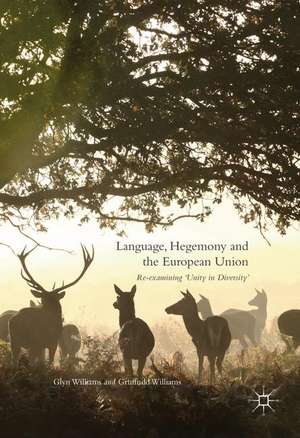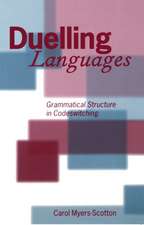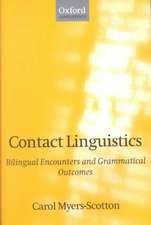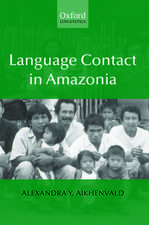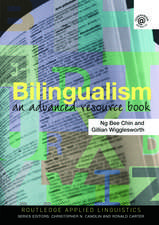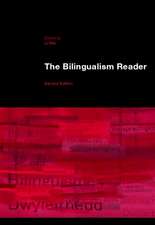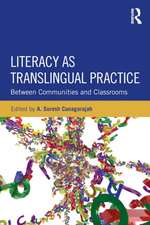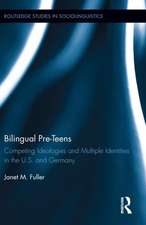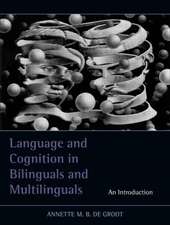Language, Hegemony and the European Union: Re-examining ‘Unity in Diversity’
Autor Glyn Williams, Gruffudd Williamsen Limba Engleză Hardback – 26 oct 2016
| Toate formatele și edițiile | Preț | Express |
|---|---|---|
| Paperback (1) | 387.96 lei 6-8 săpt. | |
| Springer International Publishing – 23 iun 2018 | 387.96 lei 6-8 săpt. | |
| Hardback (1) | 393.52 lei 6-8 săpt. | |
| Springer International Publishing – 26 oct 2016 | 393.52 lei 6-8 săpt. |
Preț: 393.52 lei
Nou
Puncte Express: 590
Preț estimativ în valută:
75.30€ • 80.52$ • 62.78£
75.30€ • 80.52$ • 62.78£
Carte tipărită la comandă
Livrare economică 17 aprilie-01 mai
Preluare comenzi: 021 569.72.76
Specificații
ISBN-13: 9783319334158
ISBN-10: 3319334158
Pagini: 352
Ilustrații: XIV, 330 p.
Dimensiuni: 148 x 210 x 24 mm
Greutate: 0.54 kg
Ediția:1st ed. 2016
Editura: Springer International Publishing
Colecția Palgrave Macmillan
Locul publicării:Cham, Switzerland
ISBN-10: 3319334158
Pagini: 352
Ilustrații: XIV, 330 p.
Dimensiuni: 148 x 210 x 24 mm
Greutate: 0.54 kg
Ediția:1st ed. 2016
Editura: Springer International Publishing
Colecția Palgrave Macmillan
Locul publicării:Cham, Switzerland
Cuprins
Chapter 1: Introduction.- Chapter 2: The EU Discourse.- Chapter 3: Globalisation and Social Change.- Chapter 4: Disciplinarity and Language.- Chapter 5: Justice.- Chapter 6: The Legal Order.- Chapter 7: Governance.- Chapter 8: Education.- Chapter 9: Unity in Diversity.
Notă biografică
Glyn Williams is a former Ford Foundation Foreign Fellow and was educated at the University of Wales, UK, and the University of California, Berkeley, USA. Prior to retirement he worked at the University of San Francisco, USA, Bangor University, UK, Cardiff University, UK and Ramon Llull University, Spain. He is author or co-author of thirteen books and more than a hundred academic papers.
Gruffudd Williams is an independent scholar educated at University College, London, UK, and Oxford University, UK. He went on to work at the European Commission in Brussels. He is currently employed in private practice at the London office of an international law firm.
Textul de pe ultima copertă
This book critically examines the European Union’s “Unity in Diversity” mantra with regard to language. It uses a theoretical framework based on hegemony both as a system and as a relationship. Operating within sociolinguistics, the book replaces the notion of ideology in poststructuralist thought with that of hegemony. The authors argue that forging unity across language communities contradicts the tenets of classical liberal theory. Global neo-liberalism influences this orthodoxy, shifting the parameters of power and political control. Over nine chapters, the authors cover topics such as globalization and social change, justice, governance and education. The book will be of interest to sociolinguists, political scientists, sociologists, as well as scholars of language and globalization and European studies.
Glyn Williams is a former Ford Foundation Foreign Fellow and was educated at the University of Wales, UK, and the University of California, Berkeley,USA. Prior to retirement he worked at the University of San Francisco, USA, Bangor University, UK, Cardiff University, UK and Ramon Llull University, Spain. He is author or co-author of thirteen books and more than a hundred academic papers.
Gruffudd Williams is an independent scholar educated at University College, London, UK, and Oxford University, UK. He went on to work at the European Commission in Brussels. He is currently employed in private practice at the London office of an international law firm.
Caracteristici
Engages with hegemony as a dynamic structure that conditions the construction and constitution of the normative order Argues that languages are sustained through the respective hegemonic systems of the state Interdisciplinary approach including perspectives from law, education and governance
